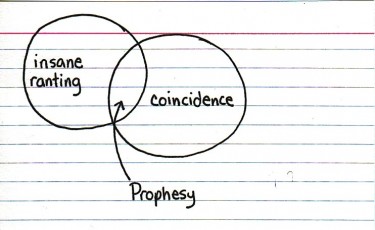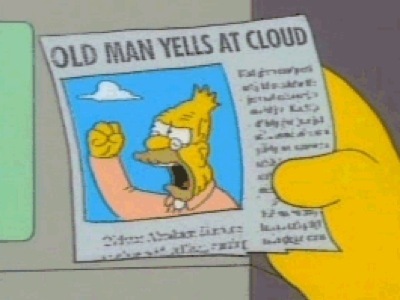We're going guest-post crazy on SIATVS this week, if two guest posts count as "guest-post crazy". Today's author is Mark from Sport without Spin, with a piece on that tennis chap.

"When Federer becomes the boy with the racket of fire, creating the illusion of art, he also creates an additional illusion: that his opponent is not, in fact, opposing him. That his opponent is in fact co-operating with him: conspiring with Federer to create these patterns of angle and trajectory, of curves and straight lines […] it becomes a
pas de deux choreographed by Federer, dancing with a man who is partner, stooge, straight man and butt: a partner who is cherished, ravished, made much of and humiliated before our eyes."
―Simon Barnes, July 2004
For much of Federer’s ascent to the upper echelons of tennis, Barnes’ words were indeed reflective of the illusion his elegant strokes created. The Federer narrative concerned nobody beyond Federer – how else could it be otherwise for a man who had dropped but three sets in his first seven Grand Slam finals? As he has climbed the increasingly steep slope to greatness, the illusion of Federer as mere artist has been dispelled, and the story of who he defeated has come to be as important as how.
Can a player truly be great if his opponents have no great achievements of their own? This, as Federer swept from one major triumph to the next as if floating on the breeze, was the only thing which dared to blot the legacy. The sport thrives on rivalries – on the Borgs and McEnroes, the Edbergs and Beckers, the Samprases and Agassis. One defines the other. If Federer kept winning without substantial challenge, might it perversely serve to tarnish his memory?
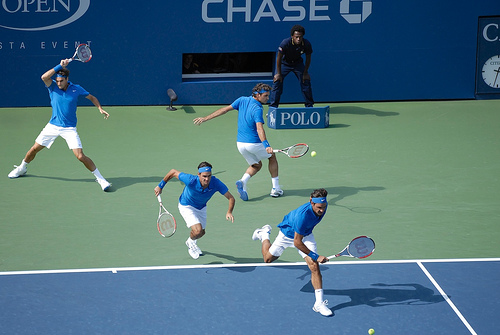
As it happened, a man from Spain emerged who simultaneously inflated the scale of Federer’s achievements and threatened to deprive him of the number of titles he might yet win. Though Rafael Nadal is his match on any surface, it was on the clay of Roland Garros where he stood proudest, most wall-like, in the way of Federer’s most coveted title, the French Open. In four years, Rafa would not be beaten here. And every year, there was a defeat for Federer along the way, denying him the statistical greatness he craved – the semi-final of 2005, then ever-more brutally in the three ensuing finals.
Last summer, Nadal yielded just four games against him en route to a straight sets win at Roland Garros, and therein the first suspicious seeds were sown that the rivalry had turned substantially in the Spaniard’s favour. Such suspicions were confirmed when Federer was beaten by Nadal at Wimbledon a month later for the first time in 42 matches and six years. Then came Federer’s tears in Australia at the start of 2009. As Federer wept in defeat, we wondered if we were watching a man fearing that the greatness that had long been presumed and credited, pending the record books catching up with his talent, might be denied. And in the process of these record-denying defeats, something of the greatness and self-assurance of the Swiss had been stifled. He was ranked the world’s number two, and with reason.
All the while, the sport’s best finally began to look like credible challengers to Federer. Novak Djokovic, tenacious, powerful and competitive, won his first Grand Slam and started to look comfortable competing with Federer and Nadal. Andy Murray followed. Federer’s window of opportunity seemed to rescind by the minute.
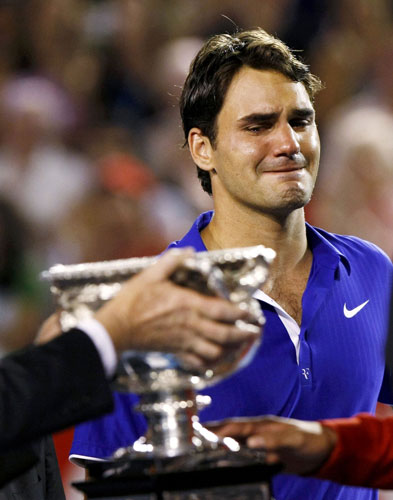
And then in one furious display from Robin Soderling in May, the obstacle to greatness was removed, the window reopened. Here was a Swede whose talent and good fortune had come together for the first time, and with a force he seemed to exercise without understanding its source, he blew Rafael Nadal off the court in Paris – off Nadal’s court in Paris. Could Federer have done the same that week? He did not need to – he merely needed to win seven tennis matches, and by the time he faced Soderling in the final, he was not against the man who beat Nadal, but rather one who had given everything to his best fortnight of tennis, and did not have anything in reserve to beat the second of the world’s best players.
If Roland Garros was the confirmation of Federer’s place in tennis history, Wimbledon was his coronation, the completion of a world tour of successes lasting six years and surpassing all others. His opponent in the final was Andy Roddick, the man who had been conquered in the 2003 Wimbledon semi-final, then again in successive finals. Roddick, younger than Federer, and winner of the 2003 US Open, had once been expected to be Federer’s great rival, a role he could not yet fulfil, a burden which consumed the tip of his talent, and left Nadal to fill the breach. He had been burned by the fire of Federer’s greatness, however, and was condemned to a career on the precipice of the biggest triumphs in tennis. He came into the final with a record of 2 victories to 18 defeats against the Swiss. But Roddick’s verve has been renewed this year, his will stronger, and Federer broke him only at the 39th attempt in the final. Roddick’s career has been defined by Federer, defined by a belief that he could not be the world’s best, and in this last glorious and cruel defeat, the only difference from previous disappointment was that Roddick had performed to such standards that he was able to help define Federer’s career.
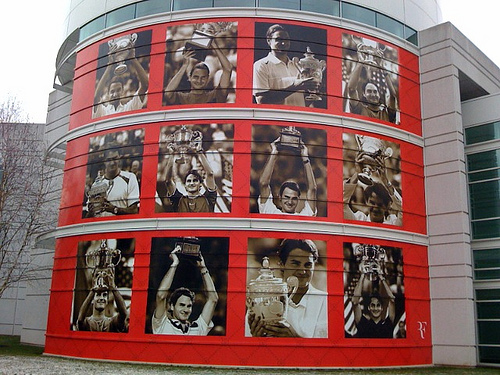
There are an infinite number of narratives being written every moment, but it is only at occasional points that we can stop, reflect on them and measure their significance. Federer could retire today with a wealth of trophies and records, enough to assure his legacy, and a rival has emerged in Nadal whose achievements are so significant in their own right that they add legitimacy to Federer’s, as well as a supporting cast of Djokovic, Murray and Roddick who have extracted and tested Federer’s obstinacy, resilience and resourcefulness. But would Roger’s Wimbledon coronation have been possible without Soderling’s day of brilliance, without the result of a match which Federer did not even contest?
The initial feeling that not beating Nadal at the French Open somehow diminishes the significance of Federer’s victory here has now subsided. Poetically, it would resonate well – if you were scripting a screenplay it would be essential – but the 23 year-old plays a game which asks such a fearsome amount of his knees that he was unable to compete effectively after the clay court season and missed Wimbledon. Perhaps in itself that is a measure of the overdrive needed to compete with Federer, whose body copes far better with the game he plays. Besides, Nadal has proven often enough that for Federer to continue recording Grand Slam victories, he has had to find more in himself, transgress simple artistry and establish character. Amongst his opponents have been some sublimely skilled men, each trying to script their own story, each taking Federer to his limits. And despite those challenges, those questions, those serves and passes, Federer has found a way to achieve more than anyone in the history of his sport.
 Read more...
Read more...
Read more...
Read more...












